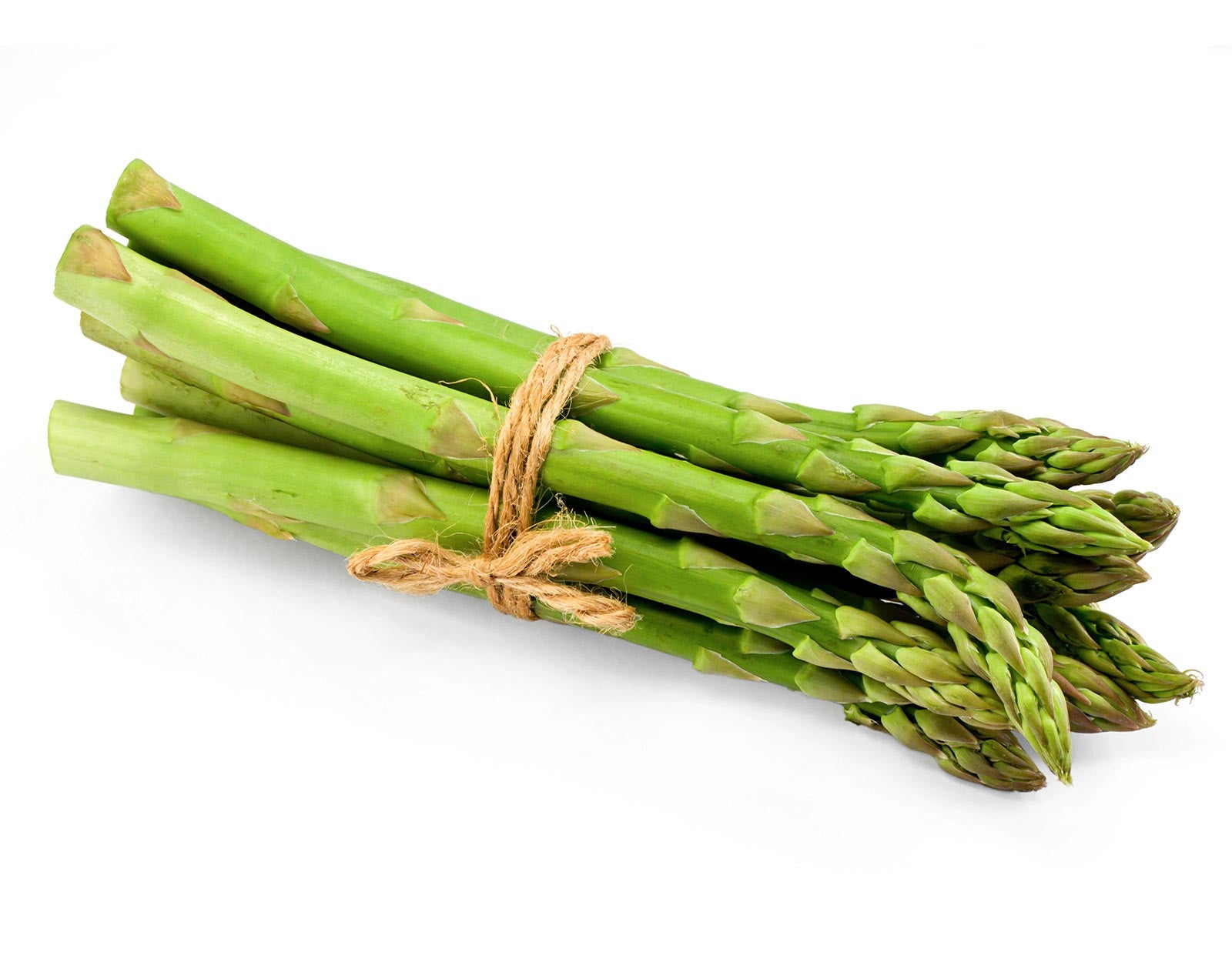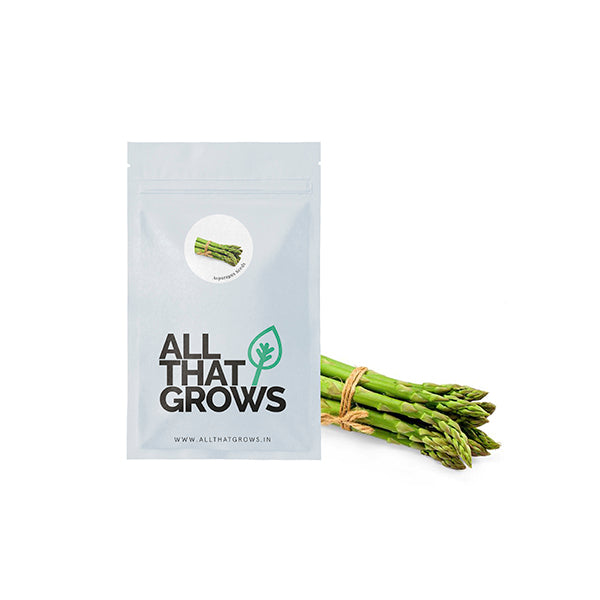



- SOWING
TIMEJune - August
- Sowing
DistanceN/A
- Fruit
Weight5-10 gms
- Fruit
ShapeThin and Long
- Days to
maturityLate
- Details
- How to sow
- Reviews
Asparagus, commonly known as garden asparagus, is a popular vegetable and mostly native to Europe and parts of Africa and Asia. Rich in Vitamin A, B6, C, potassium, iron, calcium, folate, and many other nutrients, asparagus has been used for medicinal purposes since the ancient times as well. The succulent and tender vegetable comes packed with an array of health benefits that can hardly be overseen or underscored.
A potent source of antioxidants and full of anti-inflammation and anti-cancer properties, it is also known to reduce the risk of chronic diseases like Type 2 diabetes and cardio-vascular complications. Considered a pre-biotic and a good source of dietary fiber, intake of Asparagus surely has a soothing effect on the digestive tract.
Asparagus is a versatile cooking ingredient too! It can be boiled, steamed, grilled, baked, roasted or stir friedfor a mouth-watering serving of this delicate tasting veggie whichever way you like!
Planting instructions
For the patient gardener, growing asparagus from the seeds is a rather slow but rewarding process since it takes three to four weeks for the seedlings to appear.
Soak the seeds for 3 to 4 hours before planting and plant the seeds about ½ inch deep in the soil.
Ensure that the soil in your garden bed is well drained since asparagus plants can die with excessive soil moisture.
You can also choose to allow the sprouts to appear indoors and then transplant the seedlings once they are sturdy enough to handle the outside environment.
Growing Requirements
Pests
Common Asparagus Beetle (CAB), cutworms, slugs are a few pests that can affect the growth of the plant resulting in yellowish crowns, dead crowns & brittle plants. You can try removing the affected area of the plant & keep a watch on watering frequency to avoid diseases and pests.
soil
Nutrient-rich & well-drained soil is key to the growth of Asparagus plant. Soil pH should range between 6 to 7 for asparagus to grow well. Soil temperatures for seed germination should be between 21-29°C(70-85°F)
Spot
Asparagus grows well in a bright sunny spot and can tolerate moderate shade.
Watering
Asparagus is a drought tolerant plant & can even grow well with rainfall as the only watering source. However, one should ensure moist growing soil for the plant to grow well as asparagus tends to extract moisture deep in the roots. Frequent watering would only be required once the crowns appear on the plant.
Weed Control
Weeds will often compete with the crop for nutrition and & moisture. Hence it is advisable to remove the hand pull the weeds as & when they appear.
how to harvest
Harvest the asparagus crowns after two seasons as the plants need to mature & establish their roots in the grounds.
Cut the asparagus just 1-2 inches above the ground with a sharp knife.
Rinse & add the vegetable to your greens to consume fresh, though asparagus will also last in the fridge for a couple of days.

Customer Reviews
The productiveness of any seed we sell is subject to your local climatic conditions*, the sowing method you adopt, and your commitment to the planting process. We give no warranty, expressed or implied, and are in no way responsible for the produce.
Please note that all our seasonal recommendations/ sowing information is as per the local climatic conditions. *For more information on the optimum conditions required for growing seeds in your region, please contact us at, hello@allthatgrows.in or Whatsapp us at, +91 8544865077
Questions & Answers
Have a Question?
Be the first to ask a question about this.




Asparagus Seeds
Seed Type : Non-Hybrid, Open Pollinated and Non-GMO
Stem Colour : green, purple tinted on the tip
Maturity : Late, 180 to 200 days
Sowing Time : June - August
Stem Size : 20 - 30 inches
Flavour : Fresh with earthy undertones
Grow this with
Asparagus, commonly known as garden asparagus, is a popular vegetable and mostly native to Europe and parts of Africa and Asia. Rich in Vitamin A, B6, C, potassium, iron, calcium, folate, and many other nutrients, asparagus has been used for medicinal purposes since the ancient times as well. The succulent and tender vegetable comes packed with an array of health benefits that can hardly be overseen or underscored.
A potent source of antioxidants and full of anti-inflammation and anti-cancer properties, it is also known to reduce the risk of chronic diseases like Type 2 diabetes and cardio-vascular complications. Considered a pre-biotic and a good source of dietary fiber, intake of Asparagus surely has a soothing effect on the digestive tract.
Asparagus is a versatile cooking ingredient too! It can be boiled, steamed, grilled, baked, roasted or stir friedfor a mouth-watering serving of this delicate tasting veggie whichever way you like!
Seed Type : Non-Hybrid, Open Pollinated and Non-GMO
Stem Colour : green, purple tinted on the tip
Maturity : Late, 180 to 200 days
Sowing Time : June - August
Stem Size : 20 - 30 inches
Flavour : Fresh with earthy undertones
- SOWING
TIMEJune - August
- Sowing
DistanceN/A
- Fruit
Weight5-10 gms
- Fruit
ShapeThin and Long
- Days to
maturityLate
Planting instructions
For the patient gardener, growing asparagus from the seeds is a rather slow but rewarding process since it takes three to four weeks for the seedlings to appear.
Soak the seeds for 3 to 4 hours before planting and plant the seeds about ½ inch deep in the soil.
Ensure that the soil in your garden bed is well drained since asparagus plants can die with excessive soil moisture.
You can also choose to allow the sprouts to appear indoors and then transplant the seedlings once they are sturdy enough to handle the outside environment.
Growing Requirements
Pests
Common Asparagus Beetle (CAB), cutworms, slugs are a few pests that can affect the growth of the plant resulting in yellowish crowns, dead crowns & brittle plants. You can try removing the affected area of the plant & keep a watch on watering frequency to avoid diseases and pests.
soil
Nutrient-rich & well-drained soil is key to the growth of Asparagus plant. Soil pH should range between 6 to 7 for asparagus to grow well. Soil temperatures for seed germination should be between 21-29°C(70-85°F)
Spot
Asparagus grows well in a bright sunny spot and can tolerate moderate shade.
Watering
Asparagus is a drought tolerant plant & can even grow well with rainfall as the only watering source. However, one should ensure moist growing soil for the plant to grow well as asparagus tends to extract moisture deep in the roots. Frequent watering would only be required once the crowns appear on the plant.
Weed Control
Weeds will often compete with the crop for nutrition and & moisture. Hence it is advisable to remove the hand pull the weeds as & when they appear.
how to harvest
Harvest the asparagus crowns after two seasons as the plants need to mature & establish their roots in the grounds.
Cut the asparagus just 1-2 inches above the ground with a sharp knife.
Rinse & add the vegetable to your greens to consume fresh, though asparagus will also last in the fridge for a couple of days.



 Sign In
Sign In








